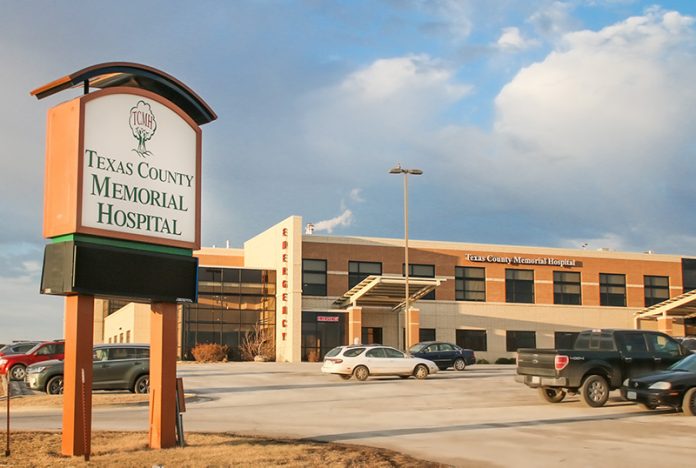Houston, MO— Missouri Hospital Association president, Herb Kuhn, was a guest speaker at the monthly meeting of the Texas County Memorial Hospital board of trustees in August.
Kuhn periodically visits all of the Missouri hospitals that are members of the MHA. He was last at TCMH in 2016.
Kuhn opened up his presentation by sharing the important role of a hospital board trustee. According to Kuhn, the trustees hold the hospital “in trust” for the communities in which it serves.
“As we see healthcare trends change, the role and responsibilities of the hospital board has evolved and governance has changed,” Kuhn said.
Kuhn explained that 15 years ago, 70-80 percent of a hospital’s business would be on the inpatient side, but now it is completely different.
“Now 80-90 percent of a hospital’s business is generated from ambulatory (outpatient) departments,” Kuhn said.
Kuhn mentioned that they continue to see hospital closures, mergers and consolidations, adding that in the last six years, ten rural hospitals have closed in Missouri.
“When those hospitals close in their communities, “medical deserts” are created throughout parts of the state, particularly in labor and delivery,” Kuhn said.
Kuhn explained that information technology in healthcare has changed substantially and the costs involved are huge.
“Hospital boards are facing a tremendous amount of public pressure to change, and they are confronted with public satisfaction constantly,” Kuhn said.
According to Kuhn, in recent months public perception of healthcare and how it is valued and supported, has grown extremely high.
“As a hospital board, those are the things you need to be thinking about,” Kuhn said. “Keeping that engagement high is key.”
Kuhn explained that healthcare reform puts a constant pressure on hospitals to decrease costs, but increase their quality of care.
“As a hospital board trustee, your role is not to manage the organization, but to provide oversight,” Kuhn said.
“The role of the governing board is to formulate policy, guide the CEO as they put things in place and make sure those policies are carried out,” Kuhn said. “It is also very important to put a good succession plan into place.”
Kuhn mentioned that it can be difficult for hospital board trustees to differentiate between “running their business” verses “governing their board.”
Kuhn explained that separating the two can be difficult, so it is important for board trustees to “check” themselves regularly.
“How do you do this?” Kuhn asked. “You must speak your mind, ask the hard questions and expect clear answers from management, period.”
Kuhn added that board trustees must stay open-minded, trust their professional management team, themselves, their fellow trustees and always think about what is best for the community.
Kuhn explained that if board members have any doubts, they should never keep them to themselves; they need to bring them to the board and talk about them.
“Don’t accept complacency from management,” Kuhn said.
Kuhn added that board trustees should never make up their mind before the facts are out there, they should not promote any special interests and they should never do anything to undermine their fellow board trustees or hospital management.
“The role of the board is a fiduciary role, a role of trust,” Kuhn said.
“There are three really important fiduciary rules,” Kuhn said. “Obedience, care and loyalty.”
“Make sure that whatever you do on the board, that you obey the law and that the hospital obeys the law,” Kuhn said. “Carry out the hospital’s mission and vision and make sure that that you are truly following your hospital’s policies and bylaws.”
Kuhn described the duty of care as acting prudent of hospital affairs.
“Stay informed, ask the tough questions, use your independent judgement and act honestly,” Kuhn explained.
Lastly, Kuhn described the duty of loyalty as always trying to put the hospital’s best interest ahead of your own.
“Keep an eye on your #10 patient loyalty scores,” Kuhn said. “Hire clinicians that your community will support and trust, and partner with outlying facilities for services that you don’t offer, but make sure that you bring those patients back to your hospital for ongoing care.”
During his overview of the current state of healthcare in Missouri, Kuhn addressed the impact of the COVID-19 pandemic and Medicaid Expansion in the state.
“One of the “must haves” to move forward from COVID is a strong digital footprint,” Kuhn said.
Kuhn explained that telemedicine and other forms of digital physician communication with patients is here to stay.
“For the most part 80-90 percent of elective medical procedures are back in place from where they were prior to COVID,” Kuhn said. “In order to maintain that going forward, infection control is key and standards are going to be high.”
“Preparedness is everything now and going forward,” Kuhn said.
Kuhn mentioned the COVID-19 vaccine that is currently being developed.
“What will that look like for hospitals going forward, will they become voluntary or mandatory?” Kuhn asked. “Currently most hospitals require their staff to get an annual flu vaccine.”
“Right now what we don’t yet know about the COVID vaccine are two very important things,” Kuhn said. “One is the immunity level, and two is the durability. We just don’t know.”
“The effects of COVID on the insurers is also something we are going to have to watch and see how it plays out in terms of coverage and premiums for next year,” Kuhn said.
Kuhn mentioned that although Missouri was the 38th state to pass Medicaid Expansion, it passed by a narrow margin of only six percent.
“Once fully implemented, 230,000 additional people will qualify for Missouri Medicaid that were not eligible before,” Kuhn said.
“This has been a huge effort for us to get to this stage, but the work is not over yet,” Kuhn said. “It now has to be implemented and financed at the state level.”
“Because Medicaid Expansion is a constitutional amendment, it becomes law 30 days after the vote,” Kuhn said.
Kuhn explained that one of the reasons that Governor Parsons moved the amendment to the August ballot from the originally scheduled November ballot was to allow the state more time to implement the amendment should it be successful.
“Medicaid Expansion should be fully implemented in Missouri by July 1, 2021,” Kuhn said.
In his administrative report, Wes Murray, CEO at TCMH, mentioned that there has not been a decision regarding the application the hospital made to Texas County for COVID relief funds.
Not having heard from Texas County officials regarding the status of the hospital’s application, Murray mentioned that he made a visit to talk with them about it.
“Although our initial application was approximately 30 percent of the funds the county received, we are 100 percent of the hospitals in the county and we provide the majority of the healthcare services,” Murray said. “Due to the delay in the funds being distributed, it would be very difficult to complete the project by the end of the year due date.”
“After talking to the county commissioners, we will submit another application this week,” Murray said.
Murray explained that the new application will be cut down substantially from what it was initially, but that it should allow the hospital enough time for completion before the deadline, if it is approved timely.
Linda Pamperien, chief financial officer at TCMH, presented the financial report for the month of July.
“Overall revenues were down $1,126,678 from our budgeted expectations,” Pamperien said. “Inpatient volumes were down $30,379, and outpatient revenue was down $1,045,055.”
Bad debt for the month of July was $654,113.15.
Pamperien reported that $450,671 in additional federal CARES Act funds that the hospital received was recorded on the July ledger.
TCMH ended the month of July with a positive bottom line of $98,705.81 and a year-to-date loss of $1,638.528.29.
Present at the meeting were Murray; Pamperien; Doretta Todd-Willis, chief nursing officer; Rachel Davis, public relations; Amanda Turpin, quality; Linda Milholen, MD; board members, Jim Perry, OD; Omanez Fockler; Jay Loveland; Allan Branstetter; Steve Pierce; guests, Kuhn and Jay Gentry.
The next meeting of the TCMH board of trustees is Tuesday, September 22 at 12 p.m. Due to current social distancing restrictions in place as a result of COVID-19, the meeting will take place via teleconference. To attend the meeting, please call (417) 967-1236 and you will be placed into the teleconference meeting.






